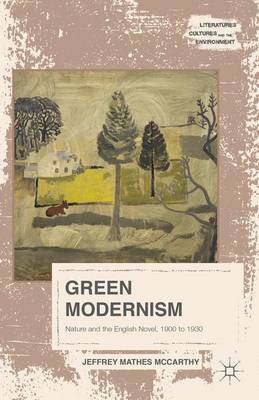
Stock image for illustration purposes only - book cover, edition or condition may vary.
Green Modernism: Nature and the English Novel, 1900 to 1930
Jeffrey Mathes McCarthy
€ 90.44
FREE Delivery in Ireland
Description for Green Modernism: Nature and the English Novel, 1900 to 1930
Hardback. One of the first studies to explore the relationship between environmental criticism and British modernism, Green Modernism explores the cultural function of nature in the modernist novel between 1900 and 1930. This theoretically engaged, historically informed book brings new materialist insights to novels by Conrad, Ford, Lawrence, and Butts. Series: Literatures, Cultures, and the Environment. Num Pages: 276 pages, black & white illustrations. BIC Classification: 2AB; 3JJC; 3JJF; 3JJG; DSBH; DSK. Category: (P) Professional & Vocational. Dimension: 225 x 147 x 22. Weight in Grams: 470.
One of the first studies to explore the relationship between environmental criticism and British modernism, Green Modernism explores the cultural function of nature in the modernist novel between 1900 and 1930. This theoretically engaged, historically informed book brings new materialist insights to novels by Conrad, Ford, Lawrence, and Butts.
One of the first studies to explore the relationship between environmental criticism and British modernism, Green Modernism explores the cultural function of nature in the modernist novel between 1900 and 1930. This theoretically engaged, historically informed book brings new materialist insights to novels by Conrad, Ford, Lawrence, and Butts.
Product Details
Format
Hardback
Publication date
2015
Publisher
Palgrave Macmillan
Condition
New
Series
Literatures, Cultures, and the Environment
Number of Pages
262
Place of Publication
Basingstoke, United Kingdom
ISBN
9781137549358
SKU
V9781137549358
Shipping Time
Usually ships in 15 to 20 working days
Ref
99-15
About Jeffrey Mathes McCarthy
Jeffrey Mathes McCarthy is the Director of the Environmental Humanities Graduate Program at the University of Utah, USA.
Reviews for Green Modernism: Nature and the English Novel, 1900 to 1930
In Green Modernism, McCarthy offers various ethical models for the dialogic and equalizing relationship of humans and nature, from a fundamental recognition of nature's active and independent presence (object-oriented ontology), to a responsible and responsive working of the land, to the `sustained intimacy' with the land he calls `dwelling.' ... The project of turning modernism's gaze from the psyche and ... Read more
